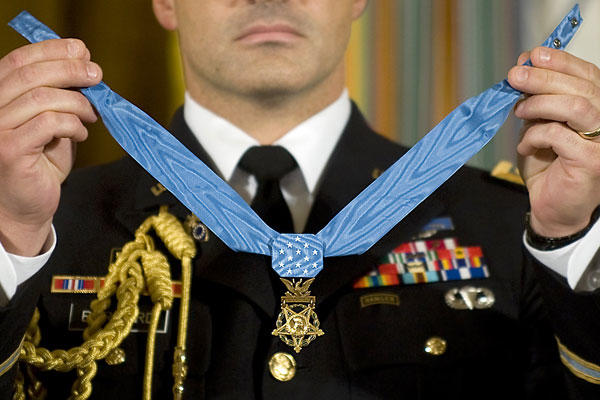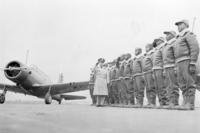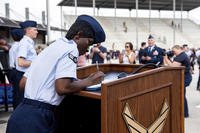The Defense Department will review some 1,100 Silver Stars and Service Crosses to determine if they warrant a higher award such as the Medal of Honor, officials announced Wednesday.
The decision follows a review of the entire military awards process begun by then-Defense Secretary Chuck Hagel in 2014, and comes alongside a series of other changes designed to make the system more consistent in its treatment of awards.
Speaking under the condition of anonymity ahead of a formal announcement by Defense Secretary Ashton Carter, officials explained that the review was prompted in part by curious trends in the award of Medals of Honor for actions following Sept. 11, 2001.
The first seven medals after that date were all posthumously awarded, prompting the Defense Department to issue clarifying guidance in 2010 informing commanders that award criteria for the distinction included "risk of life," but did not require loss of life. Since 2010, all ten Medal of Honor recipients have been living.
In another trend, officials said, three of the seven most recent Medals of Honor were actually upgrades from lesser award recommendations, while none of the earlier ones were.
"Trends showed an increased willingness of commanders to upgrade recommendations submitted from subordinate commands as the wars progressed," officials said in a statement to Military.com.
2017 Deadline
The secretaries from each military service have until Sept. 30, 2017, to review the next-highest awards to the Medal of Honor -- about 1,000 Silver Stars and nearly 100 service crosses -- to determine if they warrant higher awards. Those determinations are due to Defense Secretary Ash Carter.
Officials said it's up to the individual services to determine how to conduct that review.
Moving forward, the Pentagon is implementing changes to ensure that Medal of Honor and other valor medal recommendations are submitted and reviewed in a timely manner. Nominations for valor awards must now be initiated within 45 days of the valorous action and must be processed up the chain of command and reach the defense secretary within a year of the initial recommendation.
All awards apart from the Medal of Honor must be made within a year of the initial nomination.
To ensure that medal nominations do not get lost, the first general or admiral endorsing a Medal of Honor nomination will notify the applicable service's decorations and awards branch.
In another change, the appropriate geographic combatant commander will now review Medal of Honor nominations after a service secretary has made the recommendation so as better to advise the defense secretary and the president.
These changes are motivated in part by the case of then-Army Capt. William Swenson, who received the Medal of Honor in 2013 after bravery during the Battle of Ganjgal in Afghanistan in 2009. The 19-month delay in his award was due in part to lost awards paperwork, prompting a public apology from Hagel.
New Devices
Meanwhile, the services have a year to implement a host of other changes to ensure the consistency of awards given for valor and meritorious service under combat conditions.
The most significant changes will introduce new medal devices: a "C" device for meritorious service under combat conditions, and an "R" device for troops who use remote technology, such as drones, to directly impact combat operations from afar.
Previously, the services only used a Bronze "V" device to distinguish medals given for valor, but officials said the different branches tended to use this device differently. For the Navy and the Marine Corps, the "V" distinguished awards resulting from combat, but for the Army, it was used to indicate combat valor specifically.
"This is to ensure that service members who performed valorously were recognized at the appropriate level," an official told reporters.
The "C" device, then, will be affixed to awards earned while serving under combat conditions with "significant risk of hostile action," but outside of direct combat.
The "R" device reflects the changing nature of combat and the necessity of ensuring that remote actions with a direct impact on combat are recognized, officials said. While unmanned aircraft operators are the most likely beneficiaries of such a device, it could also be applied to cyber warfare troops and others who have direct impact on combat from a distance, officials said. The definition of "direct impact on combat operations" is still being determined and will be standardized across the Defense Department, officials said.
Tightened Bronze Star Criteria
Another change likely to have significant impact for the services is the stipulation that the Bronze Star be limited to individuals meeting the definition of "Meritorious Service under Combat Conditions," officials said.
In the past, the "V" device has been used to distinguish Bronze Stars received due to actions in direct combat and those received elsewhere. Bronze Stars will still be awarded with "V" device as appropriate, officials said, but none will receive the new "C" device, as the requirement of serving under combat conditions with risk of hostile action is implied.
"We're raising the bar," an official said, "What we've seen is, maybe it has been … a little too loose in the past."
While these definitions will change medal awards going forward, officials said no previously awarded Bronze Stars will be reviewed and the changes do not diminish any awards given previously.
Moreover, officials said that the combat conditions requirement does not require a formal declaration of boots on the ground or ground combat operations. Thus, troops now deployed to Iraq and Afghanistan would be eligible for Bronze Stars under the new criteria.
The awards review also examined the Purple Heart, awarded for wounds received in combat, but determined no changes were necessary. Officials noted that Purple Hearts approved recently for troops wounded in the July 16, 2015, terrorist shootings at military facilities in Chattanooga, Tennessee, were warranted under a previous provision including wounds resulting from a hostile terrorist attack.
Cultural Differences
Officials said they had solicited feedback from veterans service organizations, retired generals, and groups of active-duty, reserve and National Guard combat veterans in ranks ranging from E-5 to O-5 over the course of 37 focus groups and ten visits to military installations.
While the changes resulting from the feedback received and the overall review of the process will serve to standardize the awards system somewhat, officials emphasized that differences may still remain in keeping with the various service cultures.
For example, the Army has been fairly liberal in awarding the Bronze Star, the fourth-highest combat award, while the Navy and Marine Corps have been more stringent with the medal, officials said. That trend will likely continue.
The military branches are "very protective of their service cultures, especially with awards," an official said.
-- Hope Hodge Seck can be reached at hope.seck@monster.com. Follow her on Twitter at @HopeSeck.




























